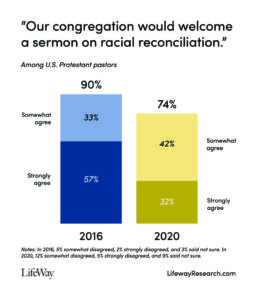A growing number of American churchgoers weren’t in the mood for sermons on race in 2020, the year that police killings of unarmed African Americans energized the Black Lives Matter movement and sparked widespread social unrest, according to a newly published survey of U.S. pastors by Lifeway Research.
 The study found a marked decrease in openness to preaching on the topic over a four-year period. Clergy reporting congregational interest in sermons on racial reconciliation declined from 90% in 2016 to 74% last year.
The study found a marked decrease in openness to preaching on the topic over a four-year period. Clergy reporting congregational interest in sermons on racial reconciliation declined from 90% in 2016 to 74% last year.
Among pastors who marked “strongly agree” when asked if such sermons are welcome, the drop was from 57% to 32% over that four-year period.
“While most pastors’ teaching is not limited to things their congregation wants to hear, it is helpful to know the reaction pastors anticipate from their congregation,” Scott McConnell, executive director of LifeWay Research, said in a summary of the survey.
The project also found that factors like race, denomination and congregation size often influenced Christians’ receptiveness to hearing topics like racial reconciliation preached from pulpits.
“African American pastors (93%) are more likely than white pastors (73%) or pastors of other ethnicities (74%) to say their church would be open to a sermon on racial reconciliation,” LifeWay said.
“83% of clergy leading congregations of 250 or more described their churches as welcoming of sermons on race.”
And 83% of clergy leading congregations of 250 or more described their churches as welcoming of sermons on race.
“Denominationally, Methodists (83%), Presbyterian/Reformed (79%), Pentecostals (78%) and Baptists (74%) are more likely than pastors of Lutheran churches (59%) to believe their congregation would like to hear a sermon on the topic,” according to LifeWay.
McConnell said divergent trends are apparent in the data. “The typical pastor is addressing racial reconciliation from the pulpit and without pushback from their congregation. However, the noticeable increase in pastors avoiding the topic and receiving criticism could signal there are new dynamics emerging.”
According to the study, 83% of pastors have preached on race during the last two years. That includes 70% who reported receiving no criticism in doing so.
“Four years ago, 5% said they were criticized for a sermon on racial reconciliation compared to 12% today,” the survey found. “One in 10 pastors (10%) said they had not preached on the topic in the last two years in 2016, while 16% say that is the case now.”
Race also was factored into the responses.
“White pastors (17%) and pastors of other ethnicities (18%) are more than twice as likely as African American pastors (6%) to say they have not addressed racial reconciliation from the pulpit in the past two years,” the report said. “White pastors (14%) are also more likely than pastors of other ethnicities (3%) to say they have received negative feedback from sermons on the topic.”
Ministers ages 18 to 44 were most likely to experience negative feedback by preaching on race.
Findings also varied by age in some cases, the survey found. Clergy 65 and older were more likely than those 45 to 54 not to preach on race in the past two years. And ministers ages 18 to 44 were most likely to experience negative feedback by preaching on race.
“Lutheran pastors (27%) are twice as likely as Baptist (13%), Presbyterian/Reformed (13%) and Pentecostal pastors (12%) to say they have not addressed the issue in a sermon in the past two years,” according to the study.
Clergy also saw a decline in requests from church leaders for sermons on racial topics from 2016 to 2020, LifeWay said. Only 21% said they have been asked to preach on the topic, compared to 73% who have not.
Divides along racial, geographical and denominational lines are evident in the data.
The study found that 56% of Black pastors have not been asked to preach on race, versus 79% of white and 77% of other ethnicities. Evangelicals, at 81%, were most likely to say church leaders did not ask them to speak from the pulpit on race.
And 79% of pastors in the South said they have received no such requests, compared to 70% in Western states.
“Lutheran (90%) and Baptist pastors (86%) are more likely than Pentecostal (77%), Restoration movement (70%), Presbyterian/Reformed (68%) and Methodist pastors (63%) to say they have not had leaders ask for a sermon on that topic,” LifeWay said.
The survey of 1,007 Protestant pastors was conducted Sept. 2 – Oct. 1, 2020, using both phone and online interviews. For the phone surveys, the calling list was a stratified random sample, drawn from a list of all Protestant churches. Quotas were used for church size. For the online surveys, invitations were emailed to the LifeWay Research Pastor Panel.


